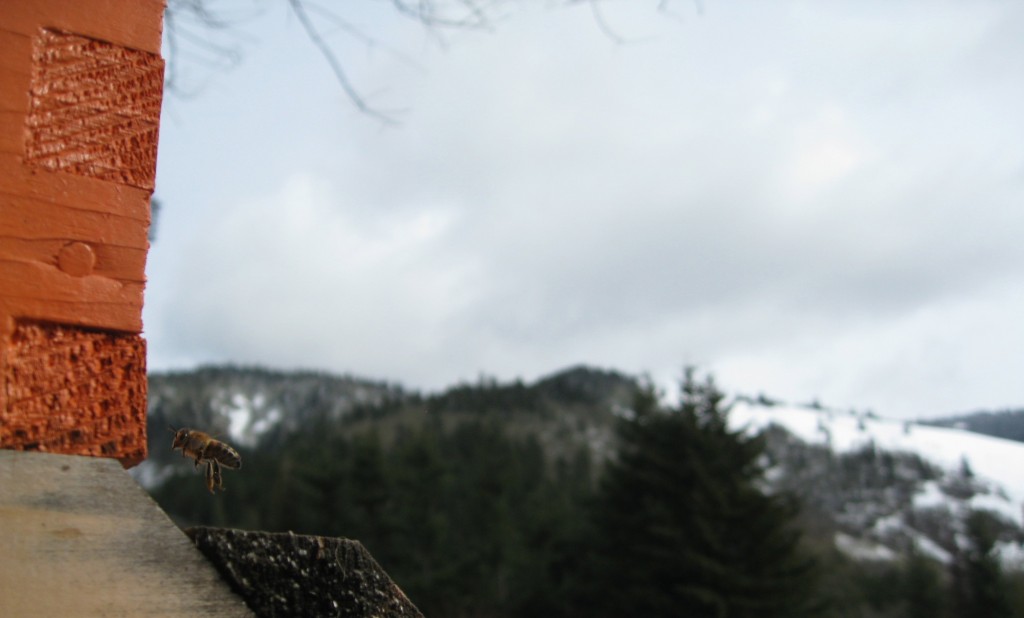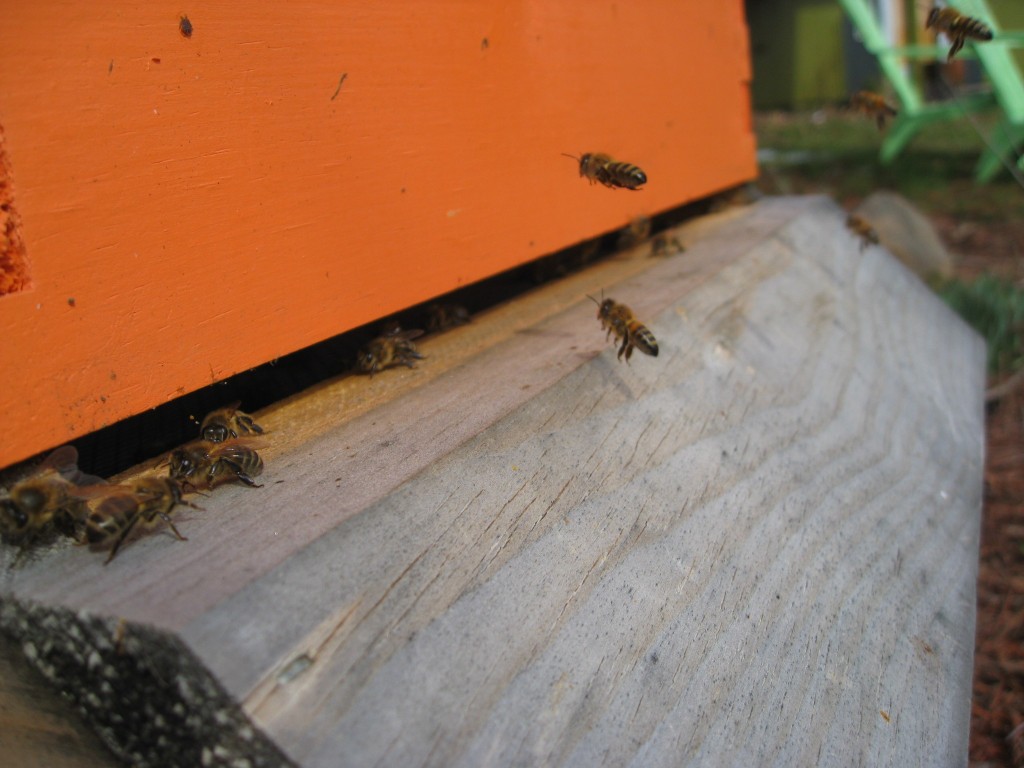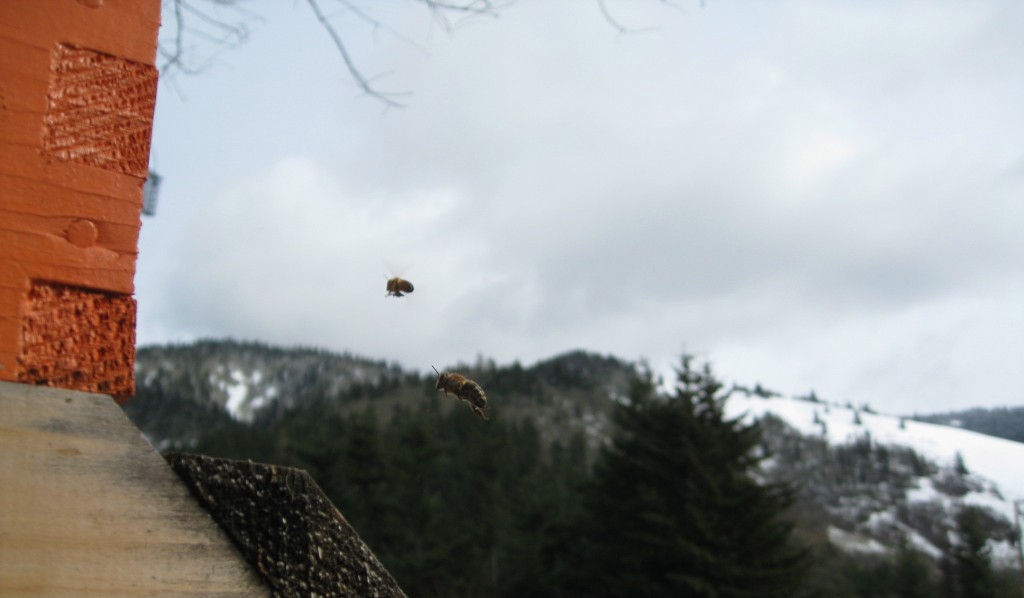 It’s 47 degrees out and there’s snow on the ground here in White Salmon, Washington and while the Italian and Carniolan bees are still clustered staying warm waiting for the 50 degree mark to come out and do their stuff, our survivor stock bees from Dan and Judy Harvey’s Olympic Wilderness Apiary are already hard at work gathering pollen outside. We inherited a nuc last year from a friend and these hard-scrabble girls are thriving despite a crummy nectar year last year. The minute we hived them we noticed a huge difference in behavior, which we’ve admiringly named ‘Serious Biz’. No hanging out on the Lido deck drinking cappuccinos like the Italians, as my partner in beekeeping crime, Tim, puts it. Its all action- satisfaction with these girls.
It’s 47 degrees out and there’s snow on the ground here in White Salmon, Washington and while the Italian and Carniolan bees are still clustered staying warm waiting for the 50 degree mark to come out and do their stuff, our survivor stock bees from Dan and Judy Harvey’s Olympic Wilderness Apiary are already hard at work gathering pollen outside. We inherited a nuc last year from a friend and these hard-scrabble girls are thriving despite a crummy nectar year last year. The minute we hived them we noticed a huge difference in behavior, which we’ve admiringly named ‘Serious Biz’. No hanging out on the Lido deck drinking cappuccinos like the Italians, as my partner in beekeeping crime, Tim, puts it. Its all action- satisfaction with these girls.
What makes these honeys special is that they are bred from a combination of survivor stock and USDA Primorsky Russian and SMR/VSH breeder queens. The survivor stock part are bees that swarmed from pioneer hives and  kept themselves over the years in the rainforest of the Olympic Peninnsula and are uniquely adapted to cold, wet weather. Interestingly, the genetic material of this survivor stock doesn’t exist in modern commercial beekeeping. Primorsky’s are known for working in cold temperatures, hygienic behavior and tracheal mite resistance. SMR stands for ‘Suppressed Mite Reproduction’ which has more recently been described by researchers as VSH or ‘Varroa Sensitive Hygiene’. To top it all off, the breeders haven’t used mite treatments in their breeder colonies for eleven years and Fumagillin for three. By working with the bees’ natural immunity, they are raising healthy and successful queens to share with others. Here’s the Stock Selection Criteria from the OWA website:
kept themselves over the years in the rainforest of the Olympic Peninnsula and are uniquely adapted to cold, wet weather. Interestingly, the genetic material of this survivor stock doesn’t exist in modern commercial beekeeping. Primorsky’s are known for working in cold temperatures, hygienic behavior and tracheal mite resistance. SMR stands for ‘Suppressed Mite Reproduction’ which has more recently been described by researchers as VSH or ‘Varroa Sensitive Hygiene’. To top it all off, the breeders haven’t used mite treatments in their breeder colonies for eleven years and Fumagillin for three. By working with the bees’ natural immunity, they are raising healthy and successful queens to share with others. Here’s the Stock Selection Criteria from the OWA website:
Hygienic Behavior – minimum of 95% removal of killed brood in 24 hours
Varroa Resistance – 5% or below: UNTREATED.
Nosema Tolerance – demonstrate vigor with high exposure,UNTREATED.
Gentleness – Able to work without gloves.
Swarming Behavior – Not prone to swarm
Hoarding Behavior – Excellent honey producers; heavy pollen collectors
Longevity –
For Production queens: grafted from queens over-wintered minimum one season
For ‘Select’ and ‘Breeder’ queens: grafted from queens over-wintered minimum two seasons
Priced at $150-300 per queen, these bees are probably not for the beginning beekeeper or for hives sited near crops that are sprayed with pesticides. If you’ve had several successful years and live in a relatively clean landscape, you might consider trying these hardy Northwest queens. We believe in them so much that this year we plan to purchase a few queens from the OWA to establish additional hives and hopefully make some nucs available. OWA does not treat its bees and instead relies on superior genetics to survive the effects of cold wet weather, nosema, tracheal and Varroa mites. Since we do not use chemicals or antibiotics in our hives, we like knowing that our source of bees isn’t treated either. Equally important to us is knowing that drones from our hives are contributing to the genetic diversity of other colonies in our area.